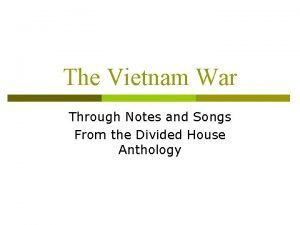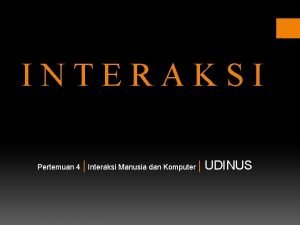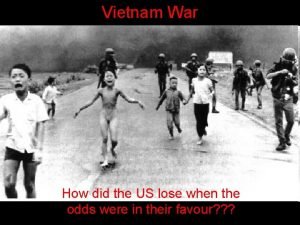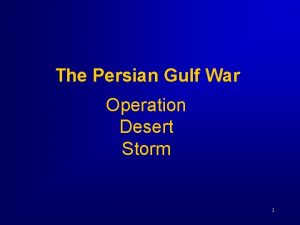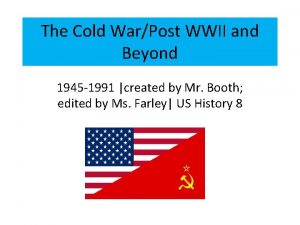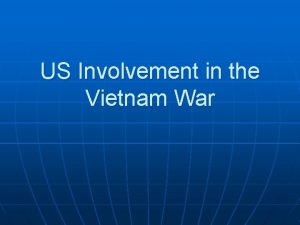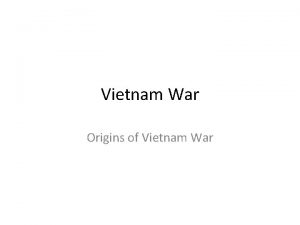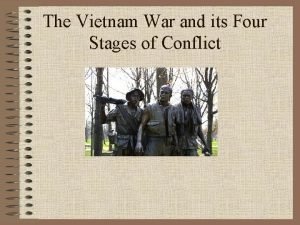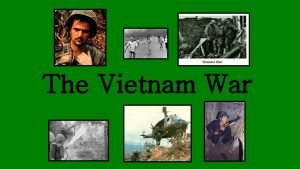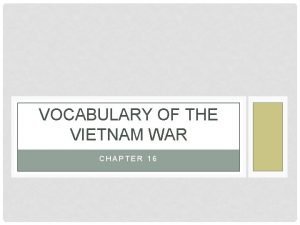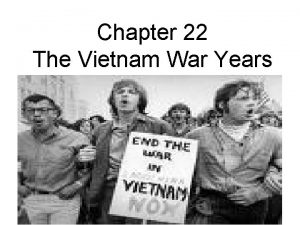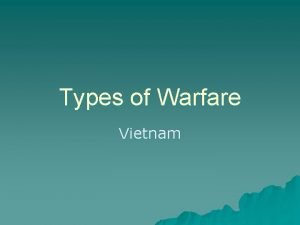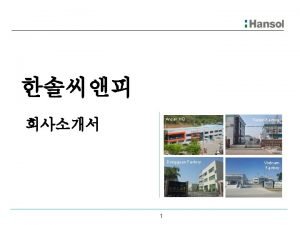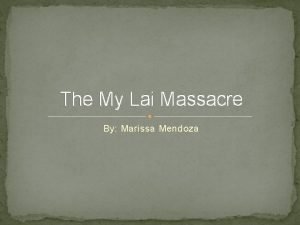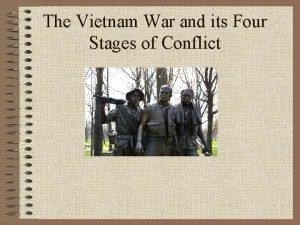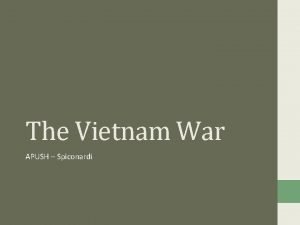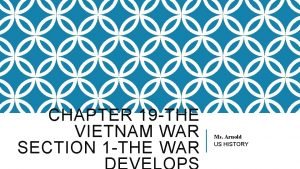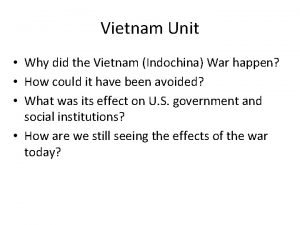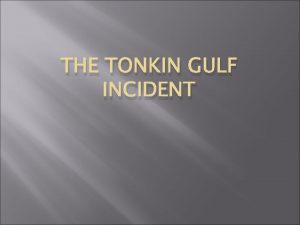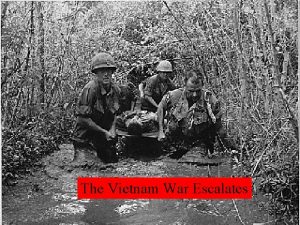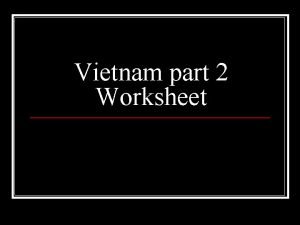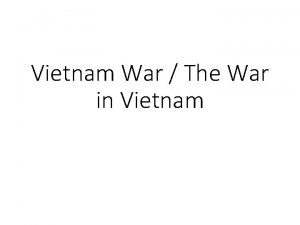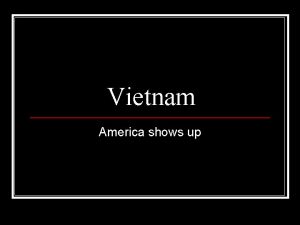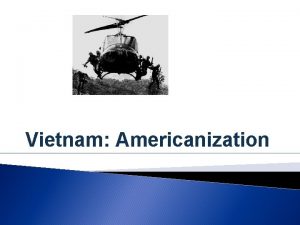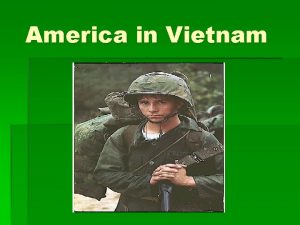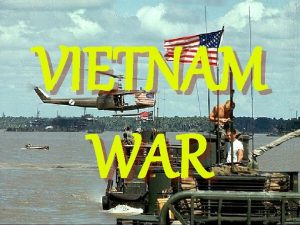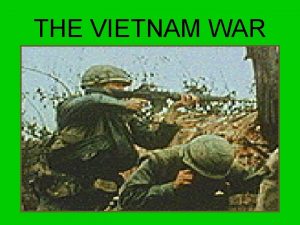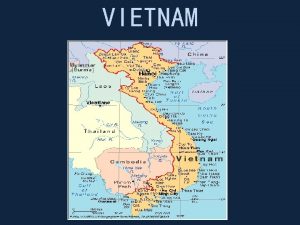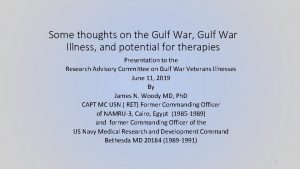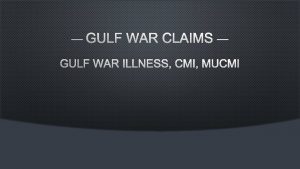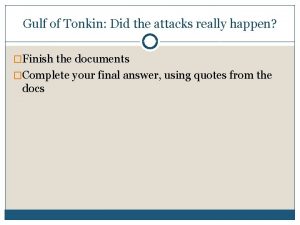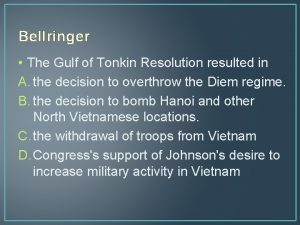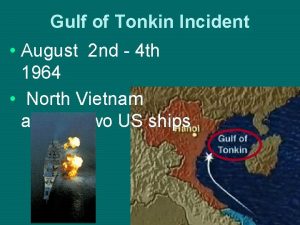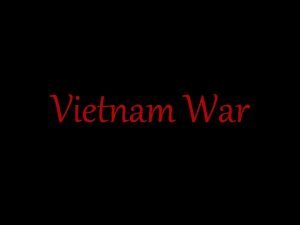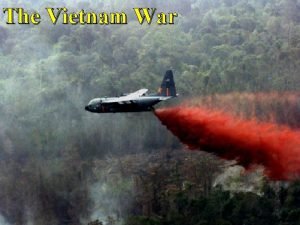Vietnam War Part II Gulf of Tonkin When
























- Slides: 24

Vietnam War – Part II

Gulf of Tonkin • • When Johnson took over the presidency, he advocated containment of Communism In August 1964, North Vietnamese torpedo boats attacked U. S. destroyers in the international waters of the Gulf of Tonkin

Gulf of Tonkin Resolution • • There was much confusion as to whether the attack really took place, but Johnson never hesitated in accepting the story He ordered a “limited” retaliatory air raid against North Vietnamese bases Johnson didn’t want to appear weak – if the U. S. didn’t uphold its commitment in Vietnam, then its guarantees to Berlin would lose credibility and turbulence in the Third World would increase He got Congress to pass the Gulf of Tonkin Resolution, which gave nearly unlimited support and war powers to the president

Gulf of Tonkin Resolution • The Gulf of Tonkin Resolution allowed Lyndon B. Johnson to: – Present himself as a peace candidate in the 1964 election because the Resolution allowed him to continue the war without a declaration of war – Continue the war without having to jeopardize his Great Society programs

Great Society • Civil Rights Act of 1964 – – Banned discrimination in jobs, public places, and voting – Allowed the executive branch to enforce desegregation and if the law was not followed • Voting Rights Act of 1965 – – Allowed for federal registration of voters – The federal government monitored elections – Outlawed literacy tests

Great Society • Medicare Act (1965) – – Provided federal funding for medical care for the elderly • Medicaid Act (1965) – – Provided federal funding for medical care for the poor

LBJ and Vietnam • After being elected in 1964, Johnson started a gradual military escalation of the war – – • Start of 1965 – 25, 000 troops End of 1965 – 184, 000 troops 1967 – 389, 000 troops 1968 – 536, 000 troops The U. S. was paying $30 billion a year for the war

LBJ and Vietnam • By 1965, the Viet Cong were steadily expanding within South Vietnam. North Vietnamese troops and supplies poured into the south via the Ho Chi Minh Trail, a supply route that passed through Laos and Cambodia • After an attack at Pleiku that killed 8 Americans and wounded 126, President Johnson authorized the bombing of North Vietnam – Operation Rolling Thunder

More American Involvement In Vietnam • • Johnson and his advisors believed that an “escalation” of American force would drive the enemy to defeat with a minimum loss of life on both sides The North Vietnamese army began fighting with the Viet Cong in South Vietnam, using the Ho Chi Minh Trail west of the South Vietnamese border

More American Involvement In Vietnam • The Americans brought with them advanced weaponry and new tactics, but they had only limited success in jungle warfare. The enemy matched every increase in American firepower with more men and more resolve in guerrilla warfare • American officials defended their involvement by saying that they were defending a faithful democratic ally (although the governments were often corrupt)

Booby Traps and Tunnels

Booby Traps and Tunnels

American Atrocities in Vietnam • The U. S. killed any Vietnamese; all were counted as Viet Cong • Many were murdered and raped by U. S. soldiers • Search and destroy – U. S. soldiers would search for the enemy and destroy them. Then they would withdraw back to their base

American Atrocities in Vietnam • American troops “had personally raped, cut off ears, cut off heads, taped wires from portable telephones to human genitals and turned up the power, cut off limbs, blown up bodies, randomly shot at civilians, razed villages in fashion reminiscent of Genghis Khan, shot cattle and dogs for fun, poisoned food stocks, and generally ravaged the countryside of South Vietnam. ” – John Kerry at a Senate Foreign Relations Committee hearing

American Atrocities in Vietnam • Agent Orange – defoliant used to clear the jungles of Vietnam, but caused health problems in the people who came into contact with it • Napalm – used to destroy straw houses of suspected Viet Cong, but was dropped on any village and burned on innocent people

My Lai Massacre • • In March 1968, a U. S. infantry company responded to word that My Lai was sheltering 250 members of the Viet Cong When they got there, they found only women, children, and elderly Lieutenant William L. Calley, Jr. was in charge and ordered other soldiers to round up civilians and shoot them Anywhere from 200 -400 died

My Lai Massacre Hugh Thompson; far right William Calley • It only stopped when a helicopter pilot, Hugh Thompson, saw what was going on and intervened. He told his door gunner to shoot the American troops if the attack on the civilians continued • Calley was sentenced to life imprisonment, but only served less than 4 years under house arrest • Thompson was given the Soldier’s Medal – the highest military honor for bravery unrelated to fighting an enemy

World Opinion of Vietnam • • • Grew increasingly hostile; the blasting of an underdeveloped country by a mighty superpower struck many critics as foul Several nations expelled American Peace Corps volunteers Charles de Gaulle ordered NATO off French soil in 1966

Resistance to Draft • People who could receive a deferment (postponement) were: – – – • Conscientious objectors - people who chose not to fight on moral or religious grounds People with physical disabilities (some falsely claimed they had one) College students People began to notice that the draft was unfair, especially to the poor and African Americans

Resistance to Draft • From 1961 to 1965, African Americans accounted for 25% of the deaths in Vietnam, while they made up 13% of the population • Frequently half of the troops in the front line were African Americans • “We have destroyed their two most cherished institutions: the family and the village. We have destroyed their land their crops…We have corrupted their women and children and killed their men. ” – Martin Luther King, Jr. • “No Viet Cong ever called me “nigger”. ” – Muhammad Ali

Resistance to War • 100, 000 men fled to Canada to avoid military service • In October 1967, 50, 000 protesters gathered in Washington, D. C. to march on the Pentagon, home of the Defense Department. One of their famous protest chants was “Hey, hey, LBJ. How many kids did you kill today? ” • In the first six months of 1968, more than 200 major demonstrations erupted at colleges around the country

Opposition In Congress • • • Chairman of the Senate Committee on Foreign Relations William Fulbright of Arkansas led a series of widely viewed televised hearings in 1966 and 1967, during which prominent people aired their views, largely antiwar Gradually, the public came to feel that it had been deceived about the causes and “winnability” of the war A “credibility gap” opened between the government and the people

Doubts Within the Administration • • Defense Secretary Mc. Namara expressed increasing discomfort at the course of events. As a result, he was eased out of the cabinet Casualties already exceeded 100, 000 by 1968. More bombs had been dropped on Vietnam than on all enemy territory in WWII

Intelligence Efforts • • In 1967, President Johnson ordered the CIA, in clear violation of its charter as a foreign intelligence agency, to spy on domestic antiwar activists He also encouraged the FBI to turn its counterintelligence program, code-named “Cointelpro” against the peace movement. They charged that leading “doves” were communist sympathizers
 Gulf of tonkin
Gulf of tonkin Siklus interaksi
Siklus interaksi Description
Description Korean war vietnam war venn diagram
Korean war vietnam war venn diagram Sean tonkin
Sean tonkin Obliterative peritonitis
Obliterative peritonitis Tonkin model of grief
Tonkin model of grief Gulf war
Gulf war Gulf war syndrome
Gulf war syndrome List of soldiers in desert storm
List of soldiers in desert storm Civil war digging deeper webquest answers
Civil war digging deeper webquest answers Vietnam
Vietnam Ngo dinh diem pronunciation
Ngo dinh diem pronunciation Stages of the vietnam war
Stages of the vietnam war Vietnam war results
Vietnam war results Vietnam war vocabulary
Vietnam war vocabulary The vietnam war years chapter 22
The vietnam war years chapter 22 Vietnam war traps
Vietnam war traps Vietnam war
Vietnam war Vietnam war massacre
Vietnam war massacre Stages of vietnam war
Stages of vietnam war Vietnam war apush
Vietnam war apush President nixon endorsed vietnamization because
President nixon endorsed vietnamization because Reason for vietnam war
Reason for vietnam war Operation rolling thunder cold war
Operation rolling thunder cold war
